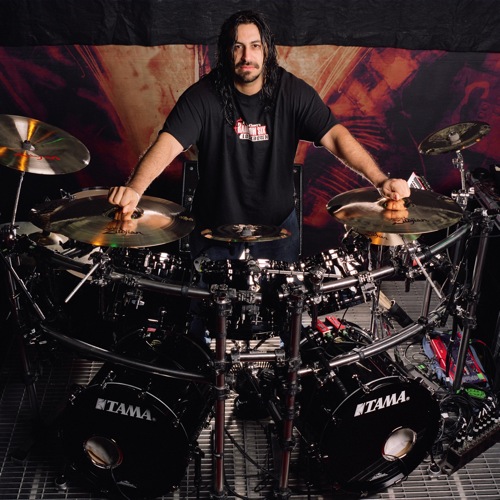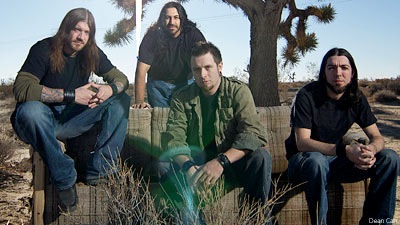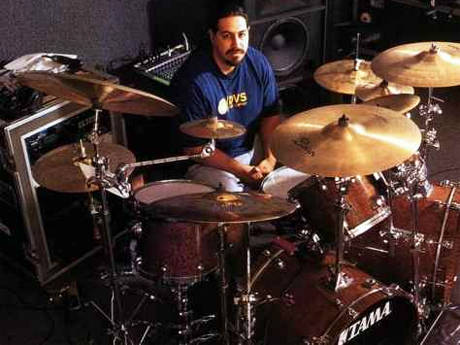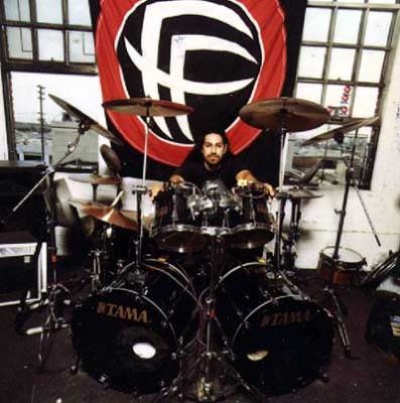
| News | | Guitar World Column | | Interviews | | Pictures | | Album Reviews | | Gig Reviews | | Release Dates | | History | | Articles | | Setlists | | Upcoming | | Contact |
March 28th 2010, Los Angeles CA
 Andrew: The first thing I want to ask you about is your new project on bringing bands to Rockband network. How's that going?
Andrew: The first thing I want to ask you about is your new project on bringing bands to Rockband network. How's that going?
Raymond: I essentially started doing that back in October 2009. I had been following the entire Rockband project. I had heard about it a year and a half ago and I had finally seen a press release about it in March 2009. so I wanted to learn more about it because obviously, getting music on to the Rockband has always been kind of a struggle because there are so many bands that want to get on there, that the bottleneck becomes trying to get your music coded. So when the idea for the Rockband network came up, I started looking at it more socially to see if there were either companies that I could team up with or find the right amount of people with the right amount of skills to be able to put something together. Sure enough, I got hit up by Ron Renn. Ron was looking for artists for his company because they had started a company already. So we started going back and forth which was kind of interesting at that time because I was looking for a company that would do this, and he happened to be from a company that was doing exactly that! He actually found me on facebook. I think this was back in August or September and it kind of started from there. And as time went on, the biggest issue that they were running into was trying to find the right people to speak to, when it came to lining up bands for the network. So obviously I've been in the industry for about 20 years now, so I know a lot of labels, I know and deal with a lot of the publishing companies through my production company because I do a lot of music licensing for video games. So it was like the perfect marriage. With my connections we were kind of able to expand on the spectrum of bands that we could bring into the network. We came up with an agreement so to speak, and essentially I became a part of the company. I have very strong ties with Harmonix. I actually worked with Harmonix back in 2000 when they were doing a game called 'Frequency' which was one of the first music games they had on. So I had known those guys for many years. We did a conference call with the people at Harmonix and then I started to talk to people at Universal, EMI and all the record labels. We've been able to essentially kind of hit the ground forward with this stuff. What I found around September, October was that not too many labels were privy to what was happening with this Rockband network and the expansion of it. So the first couple of months was more education than anything else. For the most part people didn't really know what was happening. Through the education of all of that and explaining how it works, how it is that bands implement it and so forth, so far it's going really well. We've got about may be 8 or 10 songs up there right now. I'm currently working on a deal with Universal and the same thing with EMI and a couple of the other larger publishers and record labels. It seems to be going good, it's launched and it's going really well. People have started downloading the content and so forth, so it's great!
Andrew: Things like Rockband have helped bands in some ways. Would you agree?
Raymond: It definitely does. It's a multi level tool, so for instance not only would you have a royalty coming from it, but then it also garners interest from a marketing effort. You could tie it in with a music video, with radio, with a music tour or release of an album. There are a lot of different ways to do that. I'm actually working very closely with Nuclear Blast right now because they just finished putting up their store and my company is setting up all of the back end for that so we're taking care of all of their implementation for the back end. We want to tie this in with music videos, DVD releases, albums, tours and so on and so forth down the line. It becomes another tool to market and it becomes another income. Any extra income you can get in the music industry is very welcome, for the artists, labels and publishers. This is something that, to some extent you can pirate, but it still has to be built. So to a certain extent, it's somewhat pirate proof in the sense that most people in order to play this, will have to buy the system. For now it's only on Xbox but I'm sure it'll be available on other systems soon and even on mobile. So it's a great marketing tool.
 Andrew: What's going on with Arkaea these days?
Andrew: What's going on with Arkaea these days?
Raymond: I think we've got some touring coming up in the summer, probably through to the fall. We've had a few offers over the past few months but it seems that a lot of tours have fallen by the wayside for financial reasons. So we're kind of at the mercy of whatever is going on out there. Arkaea is still a new brand so it's not something we can go and take out. With Fear Factory we were able to build our own tours. But obviously that's a brand that's been around for lot longer. For something like Arkaea we just have to see what's out there that we can jump on, and bring some kind of support to another band.
Andrew: You've been known to be the first drummer to use triggers on your drum set. Why did you choose to use it and how did it help you?
Raymond: The reason I originally wanted to start using them was because I wanted to get more of a digital sound with the drums. It's hard to get a well-defined drum sound with microphones if you don't have very much time and live that's always been a big issue. In the studio, we spend one or two days on drum sound and the only way to replicate that live is if you have something that can reproduce that exact sound that you have in the studio live. You don't have one or two days to do drum sound when you play live (laughs) because you are playing a show every night. It's a different roof, microphones, setup, pre-amps and everything changes everyday so the only way to be consistent was to have some kind of digital sound or something that could play back the sound that was recorded. That was the original idea behind it. I've always liked drum-machine sounds like Nine Inch Nails. I always had the best kick-drum and snare sounds. But you know, that's because there's a digital aspect to that which brings in a lot of definition, a lot of the high end and makes it come across a little bit more full sounding. It's a more full spectrum sound. I started toying around with triggers in 91, 92 and even on the 'Soul Of A New Machine' record it still wasn't there. We had probably 80% natural sound and 20% digital sound. It wasn't very prevalent at that time. Around 93/94 was when I really started to hone my skills as far as triggering, getting drum samples and creating drum sounds and things like that. For instance with kick drums, I actually manufactured four kick drum layers together to make one kick drum sound. You take different frequencies from different kick drums and you build your sound. It was a different kind of art, so to speak, taking different drum sounds to make one drum sound. So that concept was very ahead of its time when I was doing it. When we started to play live, that's when people really noticed it like, 'Wow it sounds like on the record'. That was the actual evolution of the whole idea that I was trying to do. Then around 'Obsolete', I took it a step forward I started changing different drum sounds for different songs. Slower songs like 'Descent' had a bigger kick drum and snare sound, way more room and echo pre-installed in the sound. It doesn't matter where I'm playing, you could still make it sound like I was playing in a hall, even though we were playing in a really small club. But it's funny that when I started doing it nobody was really doing it so there was nobody I could speak to about it. A lot of drummers started to do it in the mid to late 90s. A lot of drummers would come to me about how I was doing it, so I was able to kind of explain it to people. Pretty much everybody uses it now. As far as how it changed the way I played, I don't know if it really changed the way I played as much as it was able to enhance what I was trying to do, which was play very mechanical, play not so much on time, but just play rudiments that was almost inhuman or sub-human. The digital sound allowed me to portray the playing style. If you're hitting the kick drum, it's the same sound every time you hit it. But it made it sound very mechanical on top of the fact that I was playing rudiments that were very mechanical.
 Andrew: You drumming also has a lot of quick double bass bursts in it. Do you think that's just somehow restricted to certain kinds of metal like industrial or death?
Andrew: You drumming also has a lot of quick double bass bursts in it. Do you think that's just somehow restricted to certain kinds of metal like industrial or death?
Raymond: One of the things that we were trying to do, was we wanted to do something that was different. A lot of the drummers that were playing at that time, it was very similar. They sounded the same in the sense that the double bass didn't really have any patterns to it. You would hear a lot of different rudiments or patterns on the snares, but nobody ever really did that on the kick drums. I always found that double bass can go a lot further than that. That was the idea behind it. I always kind of fell in love with the different triplets that guitar players were playing. Even in the early Metallica stuff, a lot of riffs have got triplets and rhythm. I always felt, well why can't a drummer lock into that! I want to play that riff but on the drums. It's funny I've ran into jazz drummers over the years that are actually into metal. They've said that one of the most interesting things about the way I play drums is that if you take away all the vocals, riffs and everything else and just hear the drums, you can tell what song I'm playing. The rudiments are part of the song as much as any other instrument. In other words, I'm not playing a 4-4-B where there is no way you could tell what songs I'm playing. It was always very distinctive on the rhythm of the song. I thought that was an interesting compliment that I hadn't really thought of before but nonchalantly, that's just the way I wrote music. It has been adapted by many drummers over the years but obviously people say that I'm the one that kind of created that. I wasn't even trying to be revolutionary in any way and I just knew what I was into. That was always something that was missing. Another interesting thing is, when we started the band we didn't want any guitar solos, we wanted the drums, guitars and keyboards to lock in and a singer that could sing and growl at the same time. So those were a lot of different things to implement for a band. We got a lot of crap for it when we first started. People were saying that we were fake metal, we didn't know what we were doing. So there were a lot of different ideas that Fear Factory brought into the metal industry that were very taboo at the time. I think one of them was having no guitar solos. People were like how can you be a metal band if you don't have guitar solos! Well, we are I guess. Over time it became more of a norm. I guess the only thing we could have added that we didn't was have a DJ (laughs). I think that would have been a little too much at that time.
Andrew: You have a passion for games and you said you are licensing music for games. What's going on with that right now? Are you doing anything in that direction?
Raymond: I started this production company in the late 90s. We've worked on over 50 video games. We've just finished a project for Sega and got a couple more coming up. I've got one coming up with THQ. Tomorrow night I start writing for this other motocross game that we've started working on for another company. It's been a pretty constant business. I've been into video games since the age of 10. When video games moved to the CD format, I automatically thought there would be more room for music now. May be I could get Fear Factory's music into these games. That was the original idea. This was around the mid 90s. The way that started was, there was a convention called E3. It started in 1995 and at that time we had just finished the 'Demanufacture' record and I had a backpack full of CDs. That was kind of the way I introduced Fear Factory's music to the video game world. So I handed CDs off to everybody from Sega to Nintendo to Sony and Electronic Arts and all the other companies. That was the way it started and we started working on our first game in 96 which was PC game called 'Messiah'. The first game came out in 97 and we just kind of started from then on. I think in about 98/99 we wrote original music for a game which at least up to that point no one had really done. It just kind of flourished from there and I started getting hit up by so many bands. I started helping out friends in other bands. So when I started my own company I could stop doing just Fear Factory music and I could even do other people's music and offer other services. It's been great. For me I probably enjoy it more than most people because I'm such a huge gamer. I've always been in awe of the industry, not from a fun perspective but just from the technological aspect. There is no other industry out there that moves as quickly or even in size. In the mid 90s video games became a life style. It became something more than what geeks played. When I was a kid I was considered a geek because I played video games. To go from that to being cool, it's become so massive. I just kind of hit it at the right time. Around the time I started looking was the time audio started to expand in the universe because of the amount of data that could be stored on a CD versus the cartridge back in the day.
 Andrew: The physical fitness aspect is probably more important for a drummer than other members of a band. What do you do to maintain that?
Andrew: The physical fitness aspect is probably more important for a drummer than other members of a band. What do you do to maintain that?
Raymond: A lot of it is just practise. It's funny to say because somebody expects me to come up with this holy grail. But it really comes down to practise! I started playing drums when I was 15 but I started doing this style when I was 17. I've been doing that for a long time and really, I'm the guy who kind of created it to a certain extent. So it's almost like people follow my lead when it comes to that stuff but it's kind of cool to see that there are fans of the band that are curious to see what I come up with next. I always thought it was really cool to have that level of fans. What I do with Fear Factory is the most comfortable style of music to me. I can play other styles of music but I feel at home when I'm playing all those crazy patterns and rudiments. For me it's just commonplace. That's the style I'm known for and the most I'm comfortable doing. So for me it's like second nature.
Andrew: What are your upcoming musical commitments in terms of gigs and studio sessions?
Raymond: We're looking at some summer and late fall time stuff for Arkaea. So if things start to pick up there then I'm going to probably on tour for a while. We're planning for that and then on my plate I've got the video game projects I've got to do. I'm trying to finish 15 more video game projects by the end of the year, at least. I've also got a beverage company. We do a drink called 'Cocaine Energy Drink'. We sponsor tours and do a lot of different things. That probably takes up the most time and then I've got a recording studio as well. I'm working on a couple of other projects in the studio as well. So between these things, I keep myself very busy. I guess I do everything I enjoy doing (laughs). Probably if I were married I would be doing a lot less stuff. I've got a lot more time that most people. Not that it was a pain or anything, but now it is what it is! I've been very fortunate to be able to do what I want to and I have a lot of fun with it.
Looking for the best cable deals? Check out Cox Phoenix!


